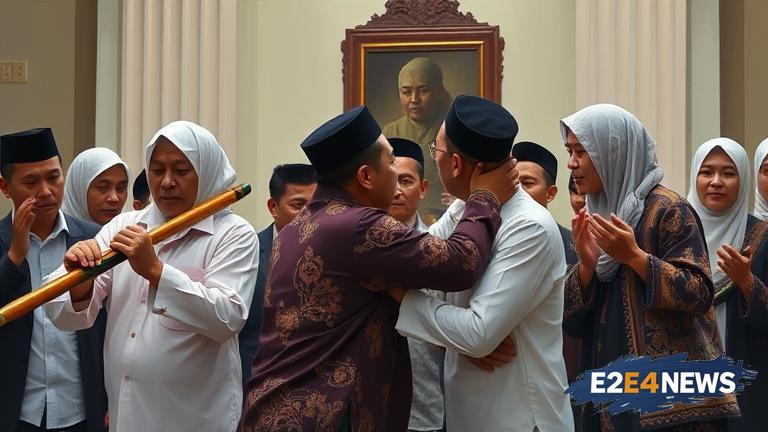In a disturbing display of strict Islamic law enforcement, an Indonesian Islamic court has publicly caned a group of men, including those charged with hugging and kissing. The caning, which took place in the city of Banda Aceh, was carried out as part of the country’s Sharia law, which prohibits public displays of affection between unmarried couples. The men, who were not named, were among a group of individuals who were found guilty of violating the law and were sentenced to receive a public caning as punishment. The caning was carried out in front of a crowd of onlookers, who gathered to witness the punishment. The incident has sparked widespread outrage and concern among human rights groups, who argue that the punishment is cruel and inhumane. The use of public caning as a form of punishment is not uncommon in Indonesia, particularly in the Aceh region, where Sharia law is strictly enforced. However, the fact that the men were caned for something as seemingly innocuous as hugging and kissing has raised eyebrows and sparked debate about the role of religion in the country’s justice system. Indonesia is the world’s most populous Muslim-majority country, and the Aceh region is one of the most conservative areas in the country. The region has implemented a strict form of Sharia law, which prohibits a range of activities, including gambling, drinking, and public displays of affection. The law is enforced by a special police force, known as the Wilayatul Hisbah, which is responsible for monitoring and enforcing the law. The caning of the men is just the latest example of the strict enforcement of Sharia law in the region. In recent years, there have been numerous reports of individuals being caned for a range of offenses, including adultery, homosexuality, and even playing music in public. The incident has also sparked concern among tourists and travelers, who may be unaware of the strict laws and customs in the region. The Indonesian government has faced criticism for its handling of human rights issues, particularly in the Aceh region. The government has been accused of failing to protect the rights of minority groups, including women and the LGBTQ+ community. The caning of the men has also raised questions about the role of religion in the country’s justice system. While Indonesia is a secular country, the Aceh region is one of the most conservative areas in the country, and the strict enforcement of Sharia law has raised concerns about the influence of religion on the justice system. The incident has sparked a heated debate about the balance between religious freedom and human rights. Some argue that the strict enforcement of Sharia law is necessary to maintain social order and protect the country’s moral values. Others argue that the law is overly restrictive and violates the human rights of individuals. The caning of the men has also highlighted the need for greater awareness and education about the laws and customs in the region. Tourists and travelers are advised to be aware of the strict laws and customs in the region and to exercise caution when interacting with locals. The incident has also sparked calls for greater reform and modernization of the country’s justice system. Human rights groups have argued that the use of public caning as a form of punishment is cruel and inhumane and should be abolished. The Indonesian government has faced pressure to reform the country’s justice system and to protect the human rights of all individuals, regardless of their religion or background.





